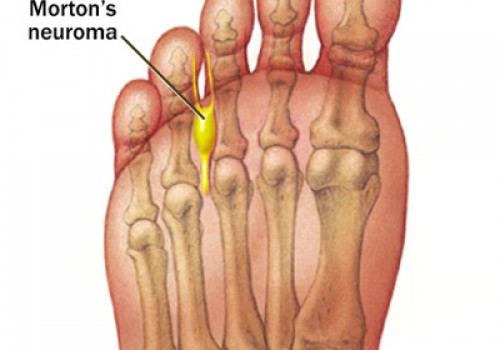A neuroma is a thickening of the nerve tissue that may develop in various parts of the body. The most common neuroma in the foot is a Morton’s neuroma. This usually occurs in the third intermetatarsal space, the space between the third and fourth toes and metatarsals, (the bones extending from the toes to the midfoot). It occurs here because this is the area in which the intermetatarsal nerve is thickest because it is made up of joining of several different nerves. The enlargement of the nerve is the result of compression and irritation of the nerve. This compression creates swelling eventually leading to permanent nerve damage.
The pain that occurs with Morton’s neuroma is usually described as a burning, tingling, or numbness in the forefoot. A feeling that something is inside the ball of the foot is also a common symptom. Symptoms usually begin gradually, sometimes with pain occurring only when wearing narrow shoes or performing a particularly aggravating activity such a running. Massaging the foot or avoiding aggravating shoes or activities may temporarily suppress the symptoms. Over time the symptoms progressively worsen and may persist for several days or weeks. The symptoms become more intense as the neuroma enlarges and the temporary changes in the nerve become permanent.
Anything that compresses or irritates the nerve can lead to a neuroma. High-heeled or narrow shoes, foot deformities such as bunions or hammertoes, flat feet or more flexible feet increase, the risk of developing a Morton’s neuroma. Certain activities such as running or racquet sports are also potential causes of developing a Morton’s neuroma due to the repetitive irritation to the ball of the foot. An injury or other type of trauma to the area may also lead to a neuroma.
Treatment
In developing a treatment plan, Dr. Hausen will first determine how long you’ve had the neuroma and evaluate its stage of development. Treatment approaches vary according to the severity of the problem.
- Padding for support of the metatarsal arch
- Custom Orthoticz
- Activity modifications
- Changes in shoewear
- Medications – non-steroidal anti-inflammatory drugs such as Ibuprofen.
- Injection therapy
Surgery may be necessary in patients who have not received adequate relief from other treatment options. Dr. Hausen will determine which approach is optimal for your condition. Regardless of whether you undergo surgical or non-surgical treatment, Dr. Hausen will recommend long-term measures, since it is important to help keep your symptoms from returning.

